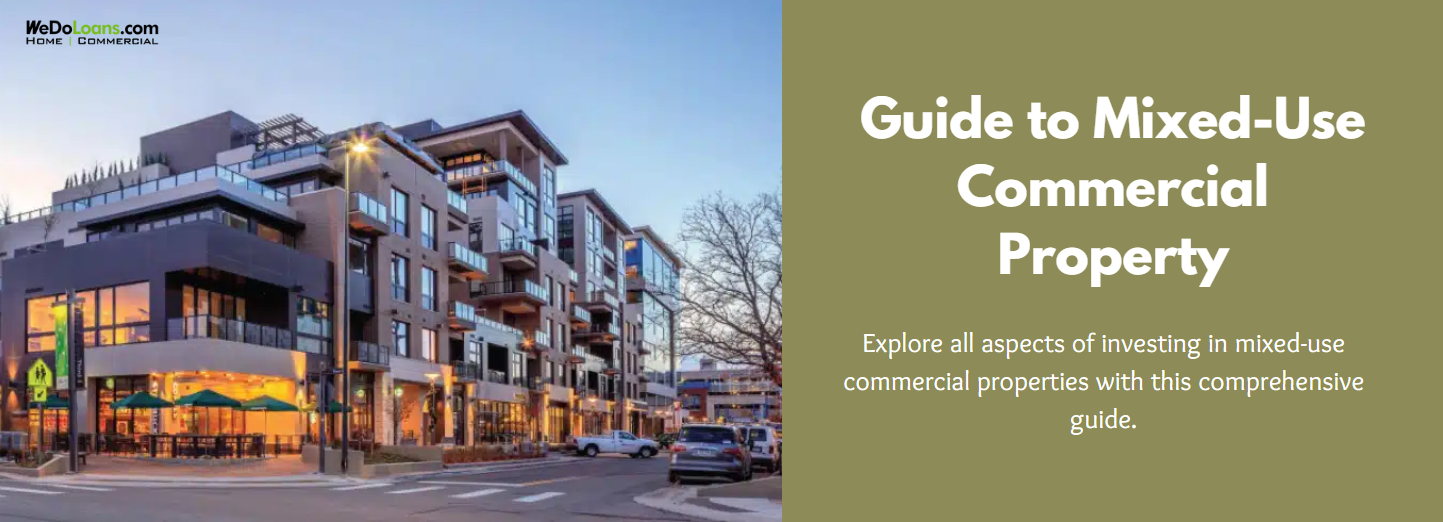
Diversification plays a crucial role in building a long-term real estate portfolio. If your portfolio is heavily concentrated in small residential properties, commercial real estate offers a valuable avenue for diversification. Within the commercial sector, mixed-use properties are among the most effective options.
What is a Mixed-Use Commercial Property?
A mixed-use commercial property is a development that combines two or more different types of uses—such as residential, commercial, or industrial—within a single property. Whether it’s a standalone building, a multi-building complex, or an entire neighborhood, as long as it integrates different functions, it qualifies as mixed-use. Examples include:
- Buildings with ground-floor retail spaces and residential units above
- Stores featuring cafes or restaurants within the premises
- Retail strips housing a mix of shops, restaurants, and service businesses
- Office buildings that include food services or small retail spaces
- Complexes with office space, apartments, eateries, and retail shops
Types of Mixed-Use Properties
Mixed-use properties come in various formats, each characterized by its combination of functions:
- Vertical Mixed-Use Developments: Commonly found in urban areas, these buildings feature different uses stacked vertically, such as retail at the bottom with residential or office spaces above.
- Horizontal Mixed-Use Developments: In these setups, different uses spread across multiple buildings within a single development. They are often found in suburban areas with more land available.
- Neighborhood Mixed-Use Developments: Larger projects that blend residential, commercial, and public spaces across a neighborhood or district.
- Transit-Oriented Developments: These are constructed around transportation hubs, such as train stations or bus terminals, offering convenience to both residents and businesses.
Advantages and Disadvantages of Mixed-Use Property Investments
Advantages:
- Diversified Income Streams: With tenants from different sectors—residential, commercial, or industrial—you reduce dependence on any single type of tenant.
- Consistent Demand: Mixed-use properties appeal to modern urban lifestyles, where convenience and proximity to amenities are highly valued.
- Community Creation: These properties often foster vibrant, self-sustaining communities, leading to long-term tenant stability and increased property value.
- Strong Value Retention: Thanks to diversified tenant bases and steady demand, mixed-use properties tend to hold their value even in uncertain market conditions.
Disadvantages:
- Complex Management: Managing different types of tenants requires expertise in multiple areas, from residential to commercial property management.
- High Initial Costs: These properties tend to be larger and more expensive, which can be a barrier for some investors.
- Potential Conflicts: Diverse tenant needs can create friction, such as noise complaints between residential and commercial tenants.
- Regulatory Hurdles: Mixed-use developments may face additional zoning and permit requirements compared to single-use properties.
Financing Mixed-Use Properties
Financing for mixed-use properties can come from various sources, including traditional bank loans, commercial real estate loans, and government-backed loans from programs like the Small Business Administration (SBA) or the Federal Housing Administration (FHA). Investors may also explore equity financing through private investors or Real Estate Investment Trusts (REITs), although these often come with stricter terms.
Key Considerations Before Investing in Mixed-Use Properties
When evaluating a mixed-use property investment, consider the following factors:
- Location: As with any real estate, location is key. Look for properties in high-demand areas with strong growth potential.
- Tenant Mix: Ensure that the mix of tenants is compatible and meets local demand.
- Zoning Laws: Be familiar with local zoning regulations to avoid potential legal issues.
- Management Requirements: Understand the complexities involved in managing different types of tenants.
- Market Conditions: Analyze both the property itself and broader market trends in residential, commercial, and industrial real estate, along with local economic factors.
Is Mixed-Use Property Right for You?
Mixed-use property investment is not for everyone. It requires significant upfront capital, a broad understanding of multiple real estate sectors, and adept management skills. However, for experienced investors, the potential for diversified income and steady demand makes it an appealing option.
Conclusion
Mixed-use commercial properties offer a unique investment opportunity, providing multiple income streams and strong demand while also contributing to community development. Although they come with complexities, the long-term benefits can make them highly rewarding for those who are prepared.
As always, thorough research and professional guidance are crucial before making an investment decision.
